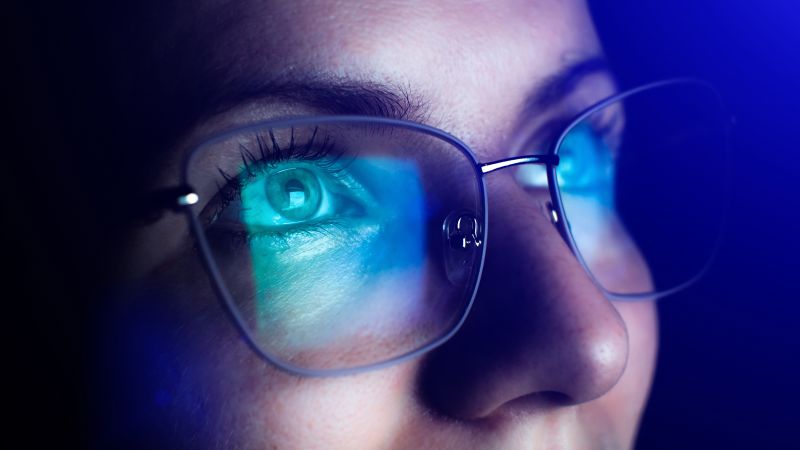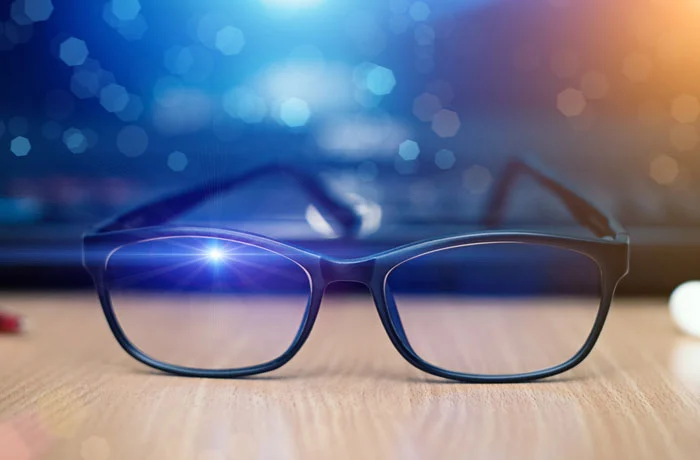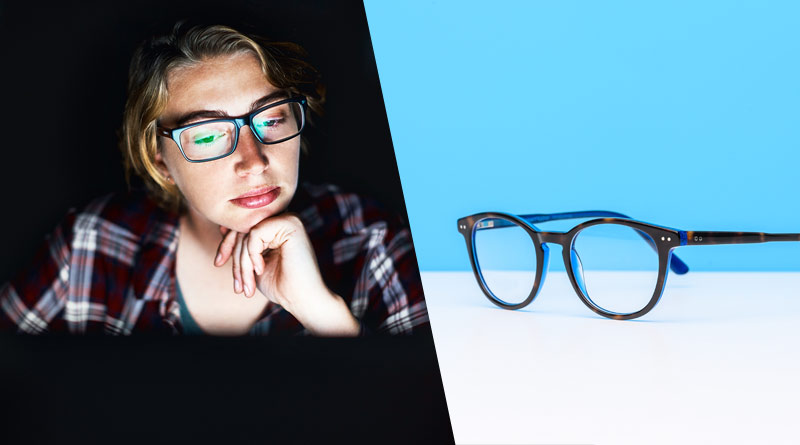Are Blue-Light Glasses Effective for Reducing Eye Strain and Improving Sleep?
Blue-light glasses are supposed to help with eye strain from using computers, improve sleep, and protect your eyes. You can buy them without a prescription or get them from your eye doctor. But do they actually work, or could they be bad for you? We’ve looked at the research to find out.
What are Blue-Light Glasses?

Blue-light glasses, also referred to as blue light-filtering lenses or blue-blocking lenses, are designed to minimize the exposure of the eyes to short-wavelength visible (blue) light. These lenses work by reducing the amount of blue light that reaches the eyes, potentially offering benefits such as reduced eye strain and improved sleep quality, particularly when using digital screens or electronic devices.
Many lenses prescribed by optometrists reduce blue light transmission by around 10-25 percent. Standard clear lenses, on the other hand, do not filter out blue light. A wide range of lens options are on the market, including filters that can be added to both prescription and non-prescription lenses. These products are heavily promoted and are gaining popularity. However, they often come with an additional cost, which varies depending on the specific product. The question then arises: is the extra expense justified?
Are Blue-Light Glasses Effective?

Outdoors, sunlight is the primary natural source of blue light. When indoors, artificial light sources like LED lights and screens from digital devices also emit varying levels of blue light. While the amount of blue light from artificial sources is lower than what we get from the sun, we’re often surrounded by these artificial lights both at home and work. As a result, we spend a significant portion of our time indoors exposed to this kind of light.
A research team, including experts from the University of Melbourne, Monash University, and City, University London, conducted a systematic review to assess whether blue light-filtering glasses were truly beneficial or potentially harmful. The study analyzed all relevant randomized controlled trials (clinical studies designed to assess the impact of interventions) involving adults. They identified 17 eligible trials conducted in six countries, involving 619 adults. The research revealed that there was no discernible advantage in using blue light-filtering lenses compared to standard clear lenses in reducing eye strain during computer use.
This conclusion was drawn from consistent findings observed in three studies that assessed the impact on eye strain over varying time frames, ranging from two hours to five days. However, when it came to potential effects on sleep, the results were less definitive. Six studies investigated whether wearing blue-light filtering lenses before bedtime could enhance sleep quality, but the findings were mixed and did not provide a clear consensus.
The studies involved individuals with a variety of medical conditions, such as insomnia and bipolar disorder. Notably, healthy adults were not part of these studies. Therefore, it remains uncertain whether blue-light filtering lenses have any impact on sleep quality in the general population.
Additionally, there was no clinical evidence found to support the use of these lenses for macula protection. The macula is the part of the retina responsible for high-detail, central vision, and the studies did not show any clear benefit in this regard.
None of the studies we reviewed assessed potential harms associated with wearing blue light-filtering lenses when compared to standard (non-blue-light filtering) lenses. Some studies did mention that participants experienced headaches, mood changes, and discomfort while wearing these glasses. However, it’s worth noting that individuals using standard lenses reported similar effects, indicating that these symptoms might not be specific to blue light-filtering lenses.
Several important considerations should be taken into account when interpreting our findings. Firstly, most of the studies had relatively short durations, limiting our ability to assess potential long-term effects on vision, sleep quality, and eye health. Additionally, our review focused on adults, and we lack information regarding potential differences in the effects of these lenses on children. Furthermore, we couldn’t draw conclusions about the possible impact of blue light-filtering lenses on various aspects of vision and eye health, including color vision, as these factors were not evaluated in the studies.
If you experience eye strain or have other eye-related concerns, it’s advisable to consult your optometrist. They can conduct a comprehensive examination of your eye health and vision and discuss potential treatment options. Like this post? Don’t forget to check out our other short stories in our Quick Read section

